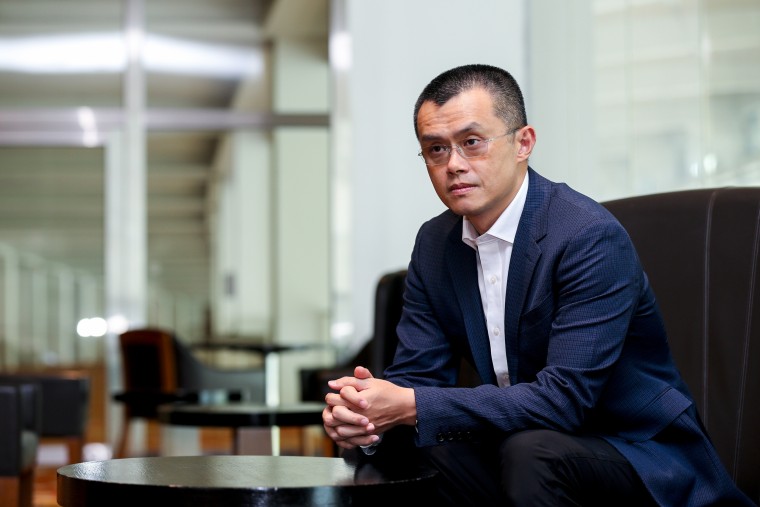The CEO of Binance, the world’s largest cryptocurrency exchange, will step down after the company pleaded guilty Tuesday to violations of the Bank Secrecy Act, an anti-money laundering law, among other charges.
The company will pay more than $4.3 billion to settle the charges, the largest penalty in the history of the Treasury Department.
In prepared remarks, Treasury Secretary Janet Yellen said Binance was guilty of “consistent and egregious violations of U.S. anti-money laundering and sanctions laws.”
The Justice Department said in a news release that Changpeng Zhao also pleaded guilty to failing to maintain an effective anti-money laundering program and would step down as chief executive.
Zhao also agreed to a $50 million fine as part of the settlement.
“Binance became the world’s largest cryptocurrency exchange in part because of the crimes it committed — now it is paying one of the largest corporate penalties in U.S. history,” Attorney General Merrick B. Garland said in the news release.
Zhao confirmed his departure from the chief executive role in a post on X, in which he acknowledged that he made mistakes. He also said Richard Teng, Binance's head of regional markets, would take over as CEO.
Zhao said he would remain a shareholder of the company and be able to consult with its leadership. He also stressed that there were no allegations related to the misuse of customer funds or market manipulation.
As part of the terms of the settlement, Binance has agreed to a third-party monitor, overseen by Treasury’s Financial Crimes Enforcement Network, to ensure the company is compliant with federal regulations. The monitor will have access to Binance’s systems, transactions and accounts, the Treasury release said.
Binance said in a blog post that it takes responsibility for its mistakes and is optimistic about its future.
"These resolutions acknowledge our company’s responsibility for historical, criminal compliance violations, and allow our company to turn the page on a challenging yet transformative chapter of learning and growth," it posted. "With the compliance and governance enhancements enshrined in our commitments, we can begin to share our vision for Binance’s exciting future and the future of the crypto industry. We are confident that Binance will emerge as a stronger company as we lay the foundation for the next 50 years."
Financial exchanges in the U.S., including those that specialize in cryptocurrency, are required to follow strict “know your customer” laws to identify their users. In a statement Tuesday, the Treasury Department said that Binance “willfully failed to report” more than 100,000 suspicious transactions from a host of sanctioned groups, including Hamas’ military arm, Qassam Brigades, Al Qaeda, the Islamic State terrorist group, a litany of criminal ransomware hackers and users in countries facing U.S. sanctions, including North Korea and Iran.
According to the Justice Department's release, Binance’s compliance employees internally noted that the company didn’t even have protocols to flag transactions that were money laundering risks.
“we need a banner ‘is washing drug money too hard these days — come to binance we got cake for you,’” an employee wrote.
Binance also never reported transactions with websites devoted to selling materials relating to the sexual abuse of children, Treasury said.
In 2019, in response to U.S. regulations, Binance created an offshoot company to serve American customers, Binance.us, while keeping its original platform for the rest of the world. But according to the Justice Department, the company still allowed a “substantial number of US customers” who were allowed to keep using the less regulated company.
The settlement adds to what has been a lengthy and brutal stretch for the crypto world that has seen the collapse of many major exchanges. Still, the price of Bitcoin, the largest cryptocurrency, has risen in the past year. It traded Tuesday at around $37,000.
The guilty pleas come less than a month after Zhao's biggest crypto rival, Sam Bankman-Fried, was found guilty of fraud. The two had at one time arguably been the faces of crypto and almost merged operations late last year when Bankman-Fried’s FTX was on the verge of collapse.
Bankman-Fried later blamed Zhao for what he claimed was a targeted attack that led to FTX’s downfall.
The announcement also comes on the heels of another major federal enforcement action against a cryptocurrency exchange. On Monday, the Securities and Exchange Commission charged U.S.-based Kraken with illegally failing to register its services with the agency, as required by securities law.
In an emailed statement to NBC News, a Kraken spokesperson said, “We disagree with the SEC’s complaint against Kraken, stand firm in our view that we do not list securities and plan to vigorously defend our position.”
Garland said the charges against Binance and FTX highlight how the government is cracking down on white collar cryptocurrency crime.
“In just the past month, the Justice Department has successfully prosecuted the CEOs of two of the world’s largest cryptocurrency exchanges in two separate criminal cases," he said in the news release. "The message here should be clear: using new technology to break the law does not make you a disruptor, it makes you a criminal.”
